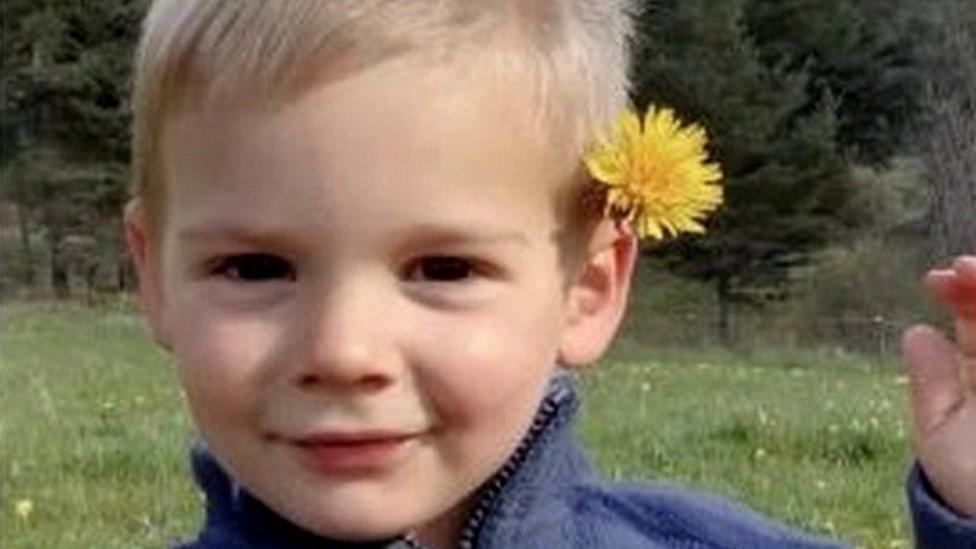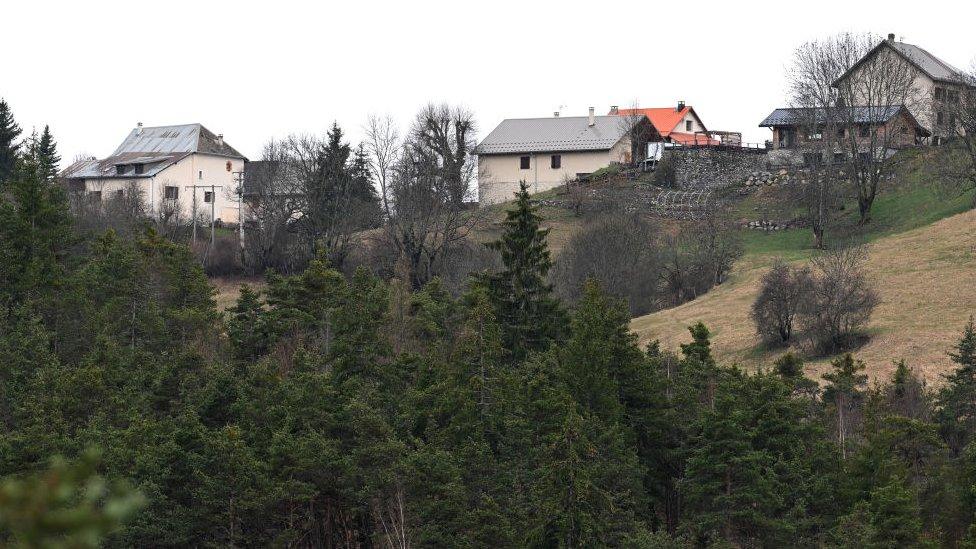French toddler Emile Soleil's remains found but his death is still a mystery
- Published

Emile Soleil had been dropped off at his grandparents' house hours before he went missing
Almost nine months after a two-and-a-half year-old boy disappeared in a tiny village in the French Alps, some of his bones have been found by a hiker in an area that had already been searched.
Detectives now have to find out whether Emile Soleil's death was an accident or if he was the victim of a crime.
His unexplained disappearance in Haut-Vernet shocked France last July.
The discovery of his remains more than 1km away came days after police returned to re-enact what had happened.
A communique from local prosecutors did not specify which bones had been found, but they were understood to include Emile's skull and some teeth. Forensic teams are now searching for the rest of his body.
Local Mayor François Balique said he was very sad at the discovery and his thoughts were with Emile's parents. "It will take a long time to recover from this disappearance and death," he told French radio.
Emile had only just been dropped off to stay at his grandparents' holiday home when he vanished in the Alpine hamlet on the slopes of the Massif des Trois-Evêchés mountain range. Only 25 people live in Haut-Vernet, at an altitude of 1,200m (4,000ft), and his parents were not there when he disappeared.
The last sighting of the child, wearing a yellow t-shirt and white shorts, was at 17:15 local time on 8 July by two neighbours who saw him walking by himself in the only street in the village but then said they had "lost sight of him".
Police were alerted by his grandmother shortly afterwards. Hundreds of people joined police with sniffer-dogs in a search the following day and two investigating judges were quickly appointed to the case, which was by then a major national story.
Emile's disappearance soon became a criminal inquiry into a potential abduction, although detectives did not have any further leads into what had happened.
The boy's parents, who are religious Catholics, said they feared the worst but told a Christian website they still hoped for a miracle.
His mother made a public appeal in November, marking what would have been Emile's third birthday. If he was still alive, she appealed for his safe return, but if he was dead, she asked that he be handed back for burial.

Only 25 people live in Haut-Vernet where Emile disappeared
Last Thursday investigators returned to Haut-Vernet, summoning 17 people including members of Emile's family, neighbours and witnesses, to reconstruct the last sightings of the boy.
French reports have focused on the boy's 58-year-old maternal grandfather, but his lawyer said she hoped investigators would not "waste too much time on him to the detriment of other lines of inquiry".
Then, on Saturday, a woman found the bones in an area that police said had been searched several times by local residents, police and helicopters with thermal cameras. Forensic scientists announced on Sunday that the DNA matched Emile's.
"This heart-breaking news was feared, and the time has come for mourning, contemplation and prayer," the child's parents said in a statement.
Police are investigating why the small skull had not been detected earlier. A local woman is said to have made the find while walking in a steep, wooded area that is not easy to access and then handed it over to local gendarmes (military police).
Marie-Laure Pezant, a spokeswoman for the gendarmerie told French TV that the bones could have been placed there by a person or even an animal, or they could even have been shifted by changing weather conditions.
Equally, police are not ruling out the possibility that his remains were missed during searches last summer because of the dense undergrowth at the time.
"Is that where he disappeared? Is that where he took his last breath, nobody knows," said Mayor François Balique. "In any case I have no idea, but the judicial inquiry will no doubt be able to find that out."
Sniffer-dogs have been searching the area for more remains and dozens of police are guarding the site to prevent a potential crime scene being contaminated in any way by hikers.
"We're looking for any trace and any clue," police commander Pierre-Yves Bardy told reporters on Monday, adding that the search would go on for as long as necessary.
A source told Le Figaro newspaper of their frustration that the woman had picked up the skull: "It would have been better if she hadn't touched anything."

